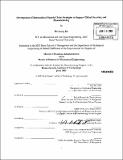| dc.contributor.advisor | Donald Rosenfield and David Simchi-Levi. | en_US |
| dc.contributor.author | Do, Wondong | en_US |
| dc.contributor.other | Leaders for Manufacturing Program. | en_US |
| dc.date.accessioned | 2010-02-09T16:58:22Z | |
| dc.date.available | 2010-02-09T16:58:22Z | |
| dc.date.copyright | 2009 | en_US |
| dc.date.issued | 2009 | en_US |
| dc.identifier.uri | http://hdl.handle.net/1721.1/51663 | |
| dc.description | Thesis (S.M.)--Massachusetts Institute of Technology, Dept. of Mechanical Engineering; and, (M.B.A.)--Massachusetts Institute of Technology, Sloan School of Management; in conjunction with the Leaders for Manufacturing Program at MIT, 2009. | en_US |
| dc.description | Includes bibliographical references (p. 79). | en_US |
| dc.description.abstract | Globalization in sourcing and manufacturing is expected to offer several different kinds of benefits. Globalized companies can produce products at cheaper costs by accessing cheaper resources and they can be close to the local market, so that they can quickly react to the needs of local markets. However, there are risks involved in global expansion. Different countries have different cultures and environments. Political relationships between the countries and global economic challenges may also affect the reliability and the profitability of globalization. Globalization requires goods to travel longer, which in turn pushes up the logistics costs. Among all the challenges, this thesis focuses on the supply chain challenges of globalization and develops the strategies to address those challenges. The thesis will provide framework to help to make international supply chain decisions. Based on this framework and the current Honeywell's environment, it will identify four different improvement opportunities and associated solutions. Each opportunity will be evaluated by appropriate models. The goal of identifying Honeywell's improvement opportunities and evaluating them is to present some structural results for each supply chain option: how the trade-offs of the option can be optimized and in each case, which option works best. In the last part, the thesis will also discuss the implementation challenges. The organizational challenges will be analyzed by using the three lenses and the change management will be discussed. | en_US |
| dc.description.abstract | (cont.) In addition to the organizational challenges, the communication challenges, which become more important in a global environment, will also be discussed. Although these are the challenges faced during the project at Honeywell, many companies that are trying to do global expansion experience same type of challenges. Thus, this discussion will help to address implementation issues that most companies face. | en_US |
| dc.description.statementofresponsibility | by Wondong Do. | en_US |
| dc.format.extent | 79 p. | en_US |
| dc.language.iso | eng | en_US |
| dc.publisher | Massachusetts Institute of Technology | en_US |
| dc.rights | M.I.T. theses are protected by
copyright. They may be viewed from this source for any purpose, but
reproduction or distribution in any format is prohibited without written
permission. See provided URL for inquiries about permission. | en_US |
| dc.rights.uri | http://dspace.mit.edu/handle/1721.1/7582 | en_US |
| dc.subject | Mechanical Engineering. | en_US |
| dc.subject | Sloan School of Management. | en_US |
| dc.subject | Leaders for Manufacturing Program. | en_US |
| dc.title | Development of international supply chain strategies to support global sourcing and manufacturing | en_US |
| dc.type | Thesis | en_US |
| dc.description.degree | M.B.A. | en_US |
| dc.description.degree | S.M. | en_US |
| dc.contributor.department | Leaders for Manufacturing Program at MIT | en_US |
| dc.contributor.department | Massachusetts Institute of Technology. Department of Mechanical Engineering | |
| dc.contributor.department | Sloan School of Management | |
| dc.identifier.oclc | 502264071 | en_US |
